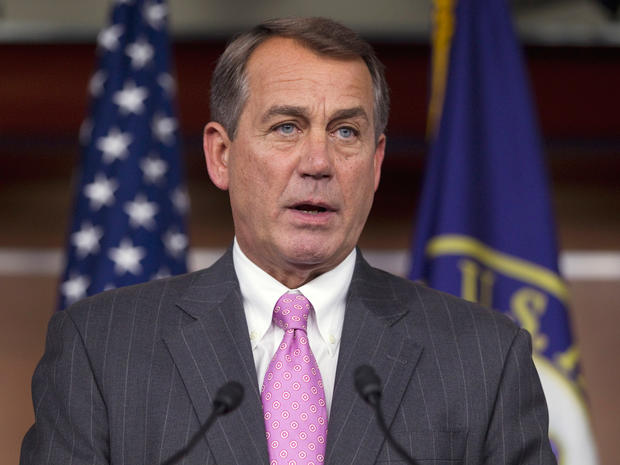Amid huge Exxon profits, Democrats link GOP to big oil
Updated 5:02 p.m. Eastern Time
With Exxon announcing nearly $11 billion in first quarter profits Thursday, Democrats are working to tie Republicans to big oil - and plan to force a vote on whether they are willing to cut oil subsidies.
The Democratic Congressional Campaign Committee today sarcastically invited Americans to the "R-Oil wedding" with an invitation that comes complete with a picture of House Speaker John Boehner photoshopped into an Elizabethan gown.
"For this wedding, in lieu of gifts, the happy couple would surely prefer more Big Oil tax breaks," said Jesse Ferguson of the Democratic Congressional Campaign Committee. "After House Republicans had a decade long relationship of protecting Big Oil taxpayer giveaways, speculations and price gouging, this wedding seems like the next step."
Boehner told ABC News Monday night that repealing subsidies and tax breaks for oil and gas companies is something Congress "certainly ought to take a look at." The industry gets about $4 billion per year in tax breaks and subsidies.
"We are in a time when the federal government's short on revenues. We need to control spending, but we need to have revenues to get the government moving," Boehner said. "They ought to be paying their fair share."
Democrats quickly pounced on the comments, with President Obama sending a letter to Congress the next day urging lawmakers to eliminate the subsidies and invest the money in "clean energy to reduce our dependence on foreign oil." In a conference call with reporters on Wednesday, Senate Majority Leader Harry Reid vowed to bring the issue up for a vote in the Senate next month. (It's just one of the tough votes he plans to force on Republicans: Reid is also planning to force a Senate vote on the controversial House GOP budget plan, which includes major changes to Medicare.) House Minority Leader Nancy Pelosi pressed Boehner to schedule a vote as well.
Democrats have tied the subsidies to high gas prices, though it's not clear how ending subsidies to oil companies would result in lower prices at the pump. Still, with Exxon earning $11 billion in a single quarter and Republicans saying the government cannot afford frivolous spending, they see the subsidies as a prime rhetorical target.
"[It's] hard to argue that given where the price of oil is now that there's a need for subsidies of the oil and gas industry," White House spokesman Jay Carney said at a press briefing.
Republicans have largely supported oil subsidies, and most remain opposed to any tax increases to deal with the country's massive deficit and debt. They say the way to lower gas prices is to increase domestic production, not end the subsidies, which they warn could increase gas prices.
Brendan Buck, a Boehner spokesman, offered this statement in response to Obama's letter: "The Speaker wants to increase the supply of American energy and reduce our dependence on foreign oil, and he is only interested in reforms that actually lower energy costs and create American jobs. Unfortunately, what the President has suggested so far would simply raise taxes and increase the price at the pump."
Senate Minority Leader Mitch McConnell, meanwhile, said that "If someone in the administration can show me that raising taxes on American energy production will lower gas prices and create jobs, then I will gladly discuss it. But since nobody can, and the President doesn't, this is merely an attempt to deflect from the policies of the past two years." McConnell's office pointed to a Congressional Research Service report finding that the Obama administration's proposed tax changes "would make oil and natural gas more expensive for U.S. consumers and likely increase foreign dependence" on a small scale.
According to the Center for Responsive Politics, Boehner has taken $346,700 in donations from the oil and gas industry in his career - though he has taken in more from 13 other industries, including insurance, securities and investment and commercial banks.
The group says individuals and political action committees tied to oil and gas companies have given $238.7 million to candidates and parties since the 1990 election cycle, with three quarters of that going to Republicans.
